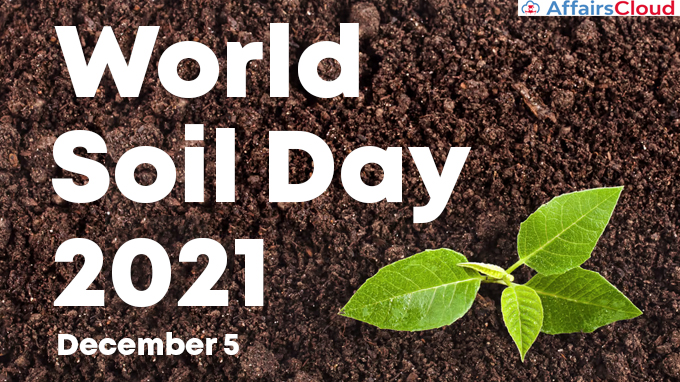
The United Nations(UN)’s World Soil Day(WSD) is annually observed across the globe on December 5th to highlight the importance of healthy soil and to advocate the sustainable management of soil resources.
- The day also coincides with the birth anniversary of H.M. King Bhumibol Adulyadej, the King of Thailand, who sanctioned the event of World Soil Day.
The World Soil Day 2021 and the 2021 campaign “Halt soil salinization, boost soil productivity” aims to raise awareness of the importance of maintaining healthy ecosystems and human well-being by addressing the challenges in soil management, fighting soil salinization, increasing soil awareness and encouraging societies to improve soil health.
Background:
i.The observance of an international day dedicated to soil was proposed by the International Union of Soil Sciences (IUSS) in 2002.
ii.Under the leadership of the Kingdom of Thailand and within the framework of the Global Soil Partnership, the Food and Agriculture Organization of the United Nations(FAO) supported the establishment of the World Soil Day (WSD) as a global platform to raise awareness about soil management.
iii.In June 2013, the FAO conference endorsed the WSD and requested the official adoption of the day at the 68th UN General Assembly(UNGA).
iv.On 20th December 2013, UNGA adopted the resolution A/RES/68/232 and proclaimed the 5th December of every year as World Soil Day and the year 2015 as the International year of Soils.
- The first WSD was observed on 5th December 2014.
Events:
i.As a part of the commemoration of Soil Day, FAO has organised a virtual event on 3rd December 2021 and felicitated the winners of the King Bhumibol World Soil Day Award and Glinka World Soil Prize.
ii.The report on the ‘Global Status of Salt-Affected Soils (SAS)’ featuring the current status, and challenges, was also launched during the event.
- Dr Qu Dongyu, Director-General of FAO and soil enthusiasts across the globe participated in the event.
King Bhumibol World Soil Day Award 2020:
The Nigeria Institute of Soil Science (NISS) has won the King Bhumibol World Soil Day Award (WSDA) 2020 for its commitment to raising awareness of the importance of healthy soils during the WSD 2020.
About the King Bhumibol World Soil Day Award:
i.The King Bhumibol World Soil Day Award was named after King Bhumibol Adulyadej of Thailand, who contributed to improving the quality of life of millions through sustainable soil management.
ii.The annual award instituted in 2018 is sponsored by the Kingdom of Thailand
iii.Objective: to encourage organizers of WSD events at all levels to facilitate challenging and outstanding celebrations around the globe.
iv.The award consists of a medal, a USD 15000 cheque, as well as a trip to Thailand to receive the prize.
Glinka World Soil Prize:
Lydie-Stella Koutika, a soil scientist from the Republic of the Congo has won the Glinka World Soil Prize in 2021, for her research on soil health and degradation processes to fight food insecurity and foster climate change mitigation and adaptation.
About Glinka World Soil Prize:
i.The Glinka World Soil Prize recognises the Global Soil Partnership members, individuals or organizations committed to solving acute national, regional or local problems of soil degradation.
ii.The prize, instituted in 2016, is financially supported by the Russian Federation.
iii.The award consists of a USD 15000 check and a Glinka gold-plated medal.
Soil salinization:
i.The major soil degradation processes threatening ecosystems are Soil salinization and sodification.
ii.They are recognised as the most important problems at a global level for agricultural production, food security and sustainability in arid and semi-arid regions.
iii.Natural salt-affected soils (SAS) contain salts and exchangeable sodium at levels that affect the growth and development of many plants, either directly (due to toxicity), or indirectly (due to effects on soil’s physical properties that restrict root growth and water percolation).
Key Points:
i.Soil salinization takes up around 1.5 million hectares (ha) of farmland per year from production and it is estimated that annually around USD 31 million is lost in agricultural productivity caused by salinization
ii.It is also estimated that around 833 million ha of land (8.7% of the planet) is affected by salinization.
About Food and Agriculture Organization of the United Nations(FAO):
Director General– QU Dongyu
Headquarters– Rome, Italy




